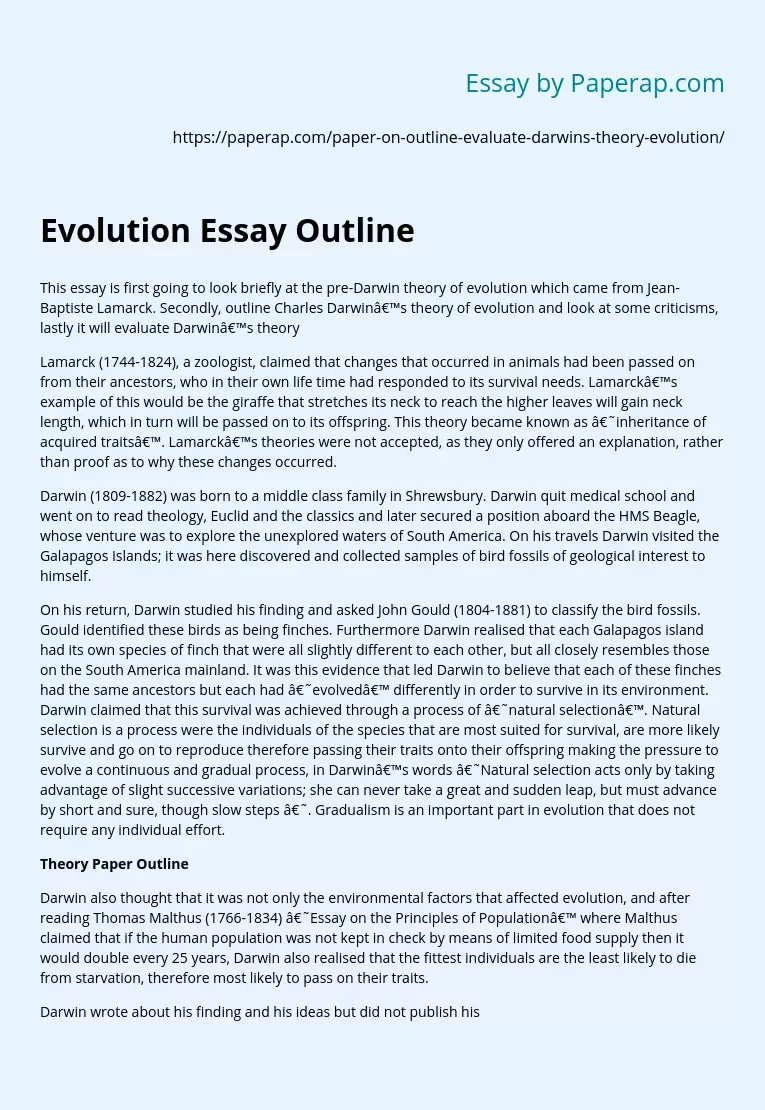Evolution Essay Outline
This essay is first going to look briefly at the pre-Darwin theory of evolution which came from Jean-Baptiste Lamarck. Secondly, outline Charles Darwin’s theory of evolution and look at some criticisms, lastly it will evaluate Darwin’s theory
Lamarck (1744-1824), a zoologist, claimed that changes that occurred in animals had been passed on from their ancestors, who in their own life time had responded to its survival needs. Lamarck’s example of this would be the giraffe that stretches its neck to reach the higher leaves will gain neck length, which in turn will be passed on to its offspring.
This theory became known as ‘inheritance of acquired traits’. Lamarck’s theories were not accepted, as they only offered an explanation, rather than proof as to why these changes occurred.
Darwin (1809-1882) was born to a middle class family in Shrewsbury. Darwin quit medical school and went on to read theology, Euclid and the classics and later secured a position aboard the HMS Beagle, whose venture was to explore the unexplored waters of South America.
On his travels Darwin visited the Galapagos Islands; it was here discovered and collected samples of bird fossils of geological interest to himself.
On his return, Darwin studied his finding and asked John Gould (1804-1881) to classify the bird fossils. Gould identified these birds as being finches. Furthermore Darwin realised that each Galapagos island had its own species of finch that were all slightly different to each other, but all closely resembles those on the South America mainland.
It was this evidence that led Darwin to believe that each of these finches had the same ancestors but each had ‘evolved’ differently in order to survive in its environment. Darwin claimed that this survival was achieved through a process of ‘natural selection’. Natural selection is a process were the individuals of the species that are most suited for survival, are more likely survive and go on to reproduce therefore passing their traits onto their offspring making the pressure to evolve a continuous and gradual process, in Darwin’s words ‘Natural selection acts only by taking advantage of slight successive variations; she can never take a great and sudden leap, but must advance by short and sure, though slow steps ‘. Gradualism is an important part in evolution that does not require any individual effort.
Theory Paper Outline
Darwin also thought that it was not only the environmental factors that affected evolution, and after reading Thomas Malthus (1766-1834) ‘Essay on the Principles of Population’ where Malthus claimed that if the human population was not kept in check by means of limited food supply then it would double every 25 years, Darwin also realised that the fittest individuals are the least likely to die from starvation, therefore most likely to pass on their traits.
Darwin wrote about his finding and his ideas but did not publish his book ‘On the Origin of Species by Means of Natural Selection, or the Preservation of Favoured Races in the Struggle for Life’ (later shortened to ‘the origin of species’) for almost 17 years due to Darwin’s own fear of what he had discovered. Also it had been argued that Darwin had contracted an illness on his travels and many feared that he had suffered a breakdown. Darwin finally published his book in 1859 due to claims being made that Alfred Wallace had too come up with a similar theory of evolution also based on Malthusian theory. In previous writing Darwin had not specifically attached his theory of evolution to mankind; however in 1971 in his book ‘Descent of men’ he stated that man has evolved from the animal kingdom.
Darwin’s theory was one that was acceptable to society, but that is not to say by everyone. Members of the Anglican Church were upset by Darwin’s theory, Darwin himself was Anglican and did not like his theory for two reasons, they were evangelical and they believed in the principle of extinction. One man, Thomas Huxley (1825-1895) supported Darwin’s theory and saw himself as Darwin’s ‘bull dog’. Huxley fought with Darwin’s theory; it was he who presented lectures for this theory. Huxley later realised that Darwin had many of the same ideas of evolution as Lamarck.
Although Darwin’s theory of evolution had very little to state on man the suggestion that the theory gives for the origins of the human race is immense, and he stated the ‘ in the future we will collect enough fossils that will show the gradual evolution and if we don’t find that, then my theory will fall.’ However the fossils that have been found do not show this gradual change, they show that there have been rapid changes during periods of stability which coincides with Gould’s discontinuity hypothesis.
Darwin’s theory that we descend from animals further confirms British empiricist Thomas Hobbes (1588-1679) who claimed that human behaviour is no different to that of animals. What is more, after Darwin claimed this, psychologists now look at animal behaviour when trying to understand human behaviour.
In conclusion no one has been as influential in our understanding of evolution as Darwin. His theory is the basis for many others theories; however, although a valid theory, the most significant flaw is the lack of any empirical evidence.
Evolution Essay Outline. (2019, Dec 05). Retrieved from https://paperap.com/paper-on-outline-evaluate-darwins-theory-evolution/

